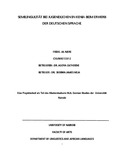| dc.description.abstract | The following study examined if the Kenyan youth are semi lingual and how this affects
the acquisition of the German language. The research therefore assumed that the youth
in Kenya are incompetent in English and Kiswahili thereby affecting their acquisition of
the German language and had among its objectives to find out if the youth in Kenya are
semilingual. As research method, interviews were conducted in two Kenyan high schools
that teach German as a foreign language. Furthermore, the students filled in
questionnaires that sought to get information about their own views on their competence
in the languages they speak. This study found the social cultural theory of second
language acquisition useful and therefore applies it in the research. The theory states that
the learning of a language is centred in the individuals’ interactions.
After conducting the research, the study could not find firm evidence to describe the
Kenyan youth as semilingual, because the criteria available for its examination were not
sufficient to enable a firm conclusion regarding the semilingalism phenomenon. | en_US |

